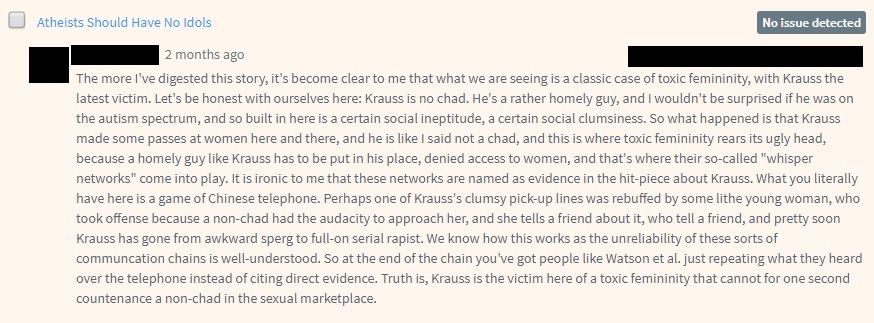
I was cleaning up the moderation queue last night, and I noticed a comment from a few weeks ago on my Lawrence Krauss post that got trapped in the spam filter:

The more I’ve digested this story, it’s become clear to me that what we are seeing is a classic case of toxic femininity, with Krauss the latest victim. Let’s be honest with ourselves here: Krauss is no chad. He’s a rather homely guy, and I wouldn’t be surprised if he was on the autism spectrum, and so built in here is a certain social ineptitude, a certain social clumsiness. So what happened is that Krauss made some passes at women here and there, and he is like I said not a chad, and this is where toxic femininity rears its ugly head, because a homely guy like Krauss has to be put in his place, denied access to women, and that’s where their so-called “whisper networks” come into play. It is ironic to me that these networks are named as evidence in the hit-piece about Krauss. What you literally have here is a game of Chinese telephone. Perhaps one of Krauss’s clumsy pick-up lines was rebuffed by some lithe young woman, who took offense because a non-chad had the audacity to approach her, and she tells a friend about it, who tell a friend, and pretty soon Krauss has gone from awkward sperg to full-on serial rapist. We know how this works as the unreliability of these sorts of communcation chains is well-understood. So at the end of the chain you’ve got people like Watson et al. just repeating what they heard over the telephone instead of citing direct evidence. Truth is, Krauss is the victim here of a toxic femininity that cannot for one second countenance a non-chad in the sexual marketplace.
I’m happy that the spam filter saved me some work, because if this had come to my attention, I would’ve deleted it anyway. (Good spam filter! Have a cookie.)
The author’s terminology marks him as a member of the “incel” community. Short for “involuntarily celibate”, these are lonely, sexually frustrated men who gather online to commiserate over their inability to find women willing to have sex with them. Supposedly, this is because attractive women (“Stacys”) are shallow and vain and only want to date similarly attractive and shallow men (“Chads”). Incels believe they’re the losers in the genetic lottery, forever shut out from female companionship because they’re ugly or scrawny, short or fat, or whatever the flaw of the day is.
As you’d expect, incel communities are a toxic smog of misogyny. They spend their days marinating in self-pity and resentment, lusting after women while also raging at them. As you can see in the above comment, more conspiracy-minded incels believe their plight isn’t just due to female mate choice, but is a malevolent plot among women to freeze out men who they deem unworthy of their favors. Many of them pine for the days of patriarchy, when women had no agency and a man could sidestep a woman’s preferences by convincing her father to marry her off.
Needless to say, self-improvement isn’t a goal among incels. They view love and sex as something they’re owed, period, regardless of what they bring to the table. The idea that their own obnoxious, hateful behavior is the problem, and that they’d have a chance of finding companionship if they learned how to treat women with respect, is something they never consider.
But in the most radical corners of incel communities, their ideology sinks to darker extremes. Some of them take to penning lurid, violent fantasies of exacting revenge against a world that hasn’t treated them as they feel they deserve. When that sense of frustrated entitlement boils over, the result is terrorism and mass murder.
Elliot Rodger, who killed six people in California in 2014, was the first incel terrorist of the modern era. Last week in Toronto, another one followed in his footsteps:
Alek Minassian, the man who killed 10 people by driving a van down a busy street in Toronto on Monday, is a terrorist.
We know this because he told us so. On Tuesday afternoon, Facebook confirmed the authenticity of a post in his name, in which he pledged allegiance to something called the “Incel Rebellion.”
And it’s likely that he won’t be the last, considering the way incel communities idolize killers. They’ve adopted the habit of literally calling Elliot Rodger a saint, and they’re already doing the same with Minassian (although the fact that he was taken alive is likely to dim his luster).
Rodger wasn’t the first rampage killer motivated by hatred of women. Even before the internet era, there were mass-murdering misogynists like George Hennard in 1991 or Marc Lepine in 1989. However, what’s different now is their ability to find each other online, where they can commiserate and give mutual encouragement to violent fantasizing. As another article points out, incel terrorism even has a set of goals, albeit bizarre and hazily defined:
They borrow a lot of language from the equality/civil rights agenda – society “treats single men like trash, and it has to stop. The people in power, women, can change this, but they refuse to. They have blood on their hands,” read one post the morning after the Toronto attack. Basically, their virginity is a discrimination or apartheid issue, and only a state-distributed girlfriend programme, outlawing multiple partners, can rectify this grand injustice. (source)
Granted, incel ideology is nothing like well-defined or coherent. The more detailed they try to be, the more outlandish they sound (just ponder this ludicrous, misogynist fantasy about segregation by government-mandated attractiveness tests). The rage and resentment come first, and the political program is, at best, hastily slapped together on top of it. But just like religious terrorism, the inherent implausibility of their ideas doesn’t negate the bloodshed they commit in service of them.
In both its rhetoric and its aims, inceldom has significant overlap with Gamergate and “men’s rights” advocates. This is unsurprising, considering that all these ideologies cater to the rage of isolated, marginalized and socially inept men.
However, the best analogy for the incel movement and its trend toward violent self-radicalization may be ISIS. Both have grown and spread in a similar way: by offering rootless, disaffected young people a sense of purpose, an overarching framework that explains their life, and an appealing outlet for their grievances. As this comment says:
I was a counter-terror analyst back in my military days, and these guys are following the exact same patterns of self-radicalization that religious extremists do.
There’s a complex series of relationships and drivers that separates the lone wolves of North America vs the more organized efforts in Europe vs the militancy you find in less stable parts of the world. Its important to understand that, or you’ll lump the wrong people together regarding motivation and incentives… but this guy fits the North American model to a T.
North American (and to a certain degree European) self-radicalization all starts with a young man feeling isolated and antagonized, and when he seeks out a support community, he is found by a toxic group that seeks to indoctrinate this vulnerable young man to their agenda. They offer community, a shoulder to cry on, sympathy, understanding — they use these emotional ties to alienate the target from their IRL peers and potential support systems.
So what do we do about this?
One suggestion that’s been made is that, if we legalized sex work, men who wanted to get laid would be able to and wouldn’t have to resort to violence. But while I support legalizing sex work in general, it’s not the solution to this. A man who feels so entitled to female companionship that he’s willing to assault and murder strangers for denying it to him is a man who’ll lash out at his intimate partner the first time she says or does anything that displeases him.
The mindset of toxic entitlement can’t be appeased. In some cases, men can be talked out of it, but I don’t think that’s a viable strategy at scale. What will help is treating it as the malignancy it is, focusing police attention in the right places. It can also only help to support #MeToo and other movements that amplify the social and cultural power of women. The more people are used to women exercising power on an equal basis with men, the more we’ll perceive ideologies like this as an aberrant attitude rather than the norm, allowing society to catch more lone wolves before it’s too late to stop them.